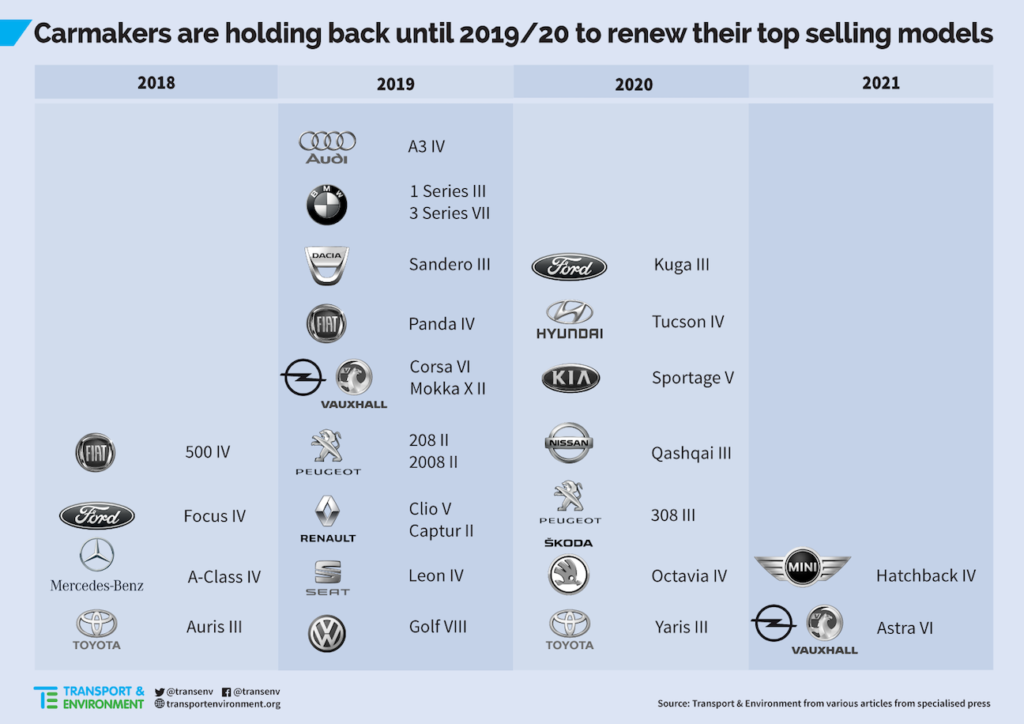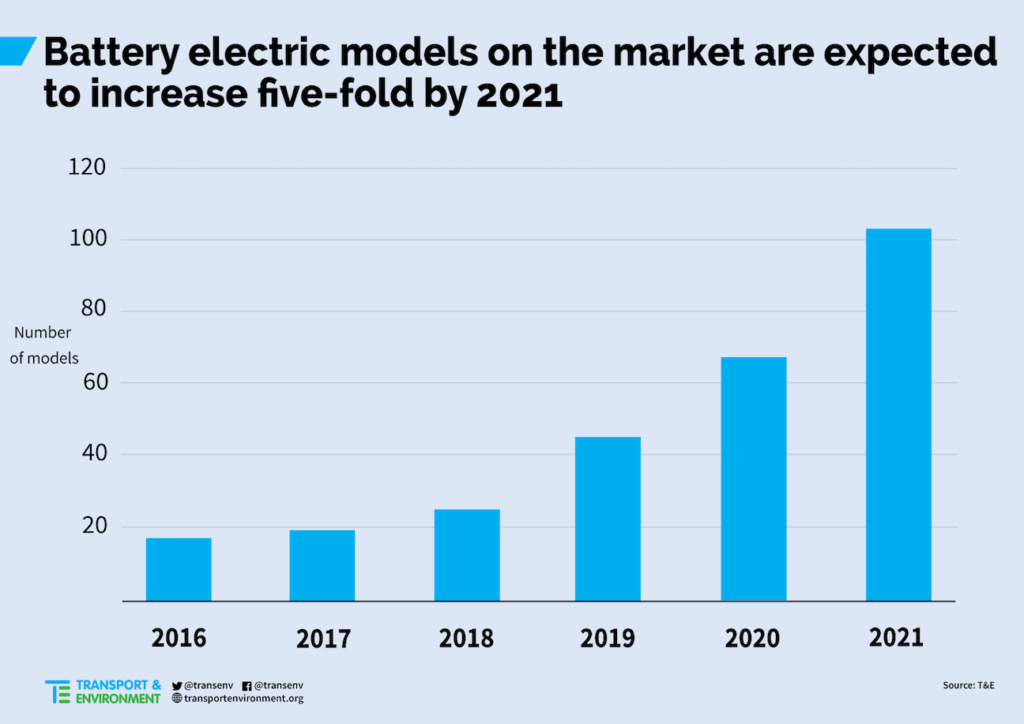Exclusive in-depth analysis:
• Only 6 of top 50 models were upgraded in 2017 – but 21 will be re-launched as more fuel-efficient, low-carbon models in 2019-2020
• Battery electric models are expected to increase five-fold to 100 by 2021, thus increasing driving-range, choice and competition
• Most European carmakers, but not Fiat, are set to meet EU’s 2021 CO2 reduction targets on time – in part by selling more plug-in vehicles
• Rising SUVs sales and increased power and performance are driving emissions increases
• CO2 impact of declining diesel sales is more than offset by lower-carbon vehicles
Carmakers are holding back sales of both electric cars and more fuel-efficient upgrades of their best selling models in Europe, new research shows. Almost all manufacturers will comply with the EU’s 2021 CO2 emissions reduction targets through a combination of selling more fuel-efficient and plug-in models and exploiting flexibilities in the regulation, green transport group Transport & Environment’s report, CO2 emissions from cars: The facts, finds. bit.ly/2HO1o6M
Only six of the top 50 selling models in Europe received a full model upgrade in 2017 and very few new plug-in cars were made available – undoubtedly contributing to the lack of progress in reducing car CO2 emissions last year.

Just four of the top-selling 50 models are set to be fully upgraded by the end of this year, followed by 14 in 2019, and seven in 2020. T&E said that seven upgrades per year is typical for the top 50 selling models. This tactic of continuing to sell old models for as long as possible makes it clear that carmakers are both optimising profits and trying to deceive regulators that they will struggle to hit the 2021 CO2 targets as the EU ponders new targets for 2025.[1] But the price is being paid by car buyers – for whom more fuel-efficient models are not yet available – and by the planet as CO2 emissions from cars and vans continue to rise.
Greg Archer, clean vehicles director at T&E, said: “Carmakers are shameless, crying wolf that they can’t meet their CO2 targets and blaming declining diesel sales, while pushing old, inefficient, high-performance SUVs to maximise their profits. As a result CO2 emissions are rising and their customers are hit with higher fuel bills. But the reality is almost all serious carmakers in Europe will hit their targets and avoid fines.”
Manufacturers’ strategy to comply with the 2021 targets is to increase sales of battery electric and plug-in hybrid vehicles, and this is likely to increase their market share in Europe significantly to 5-7% by 2021, the report finds. But the analysis shows carmakers are also holding back the launch of new plug-in vehicles until the last possible moment. There are only 20 battery electric cars on sale at present but by 2021 this is expected to leap to reach more than 100 if companies deliver on their announcements.

Cars and vans account for two-thirds of carbon emissions from transport, which is the highest emitting sector in the EU with 27% of total CO2 emissions. Transport is the only sector whose climate impact has grown since 1990. Also, last year the EU’s oil consumption – a good proxy for transport CO2 emissions – rose by 2%, the highest annual growth since 2001.[2] The EU is currently debating a European Commission proposal for new car CO2 reduction targets of 15% and 30% in 2025 and 2030 respectively, but these targets would not be sufficiently demanding to enable EU countries to meet their binding 2030 climate goals.[3]
Greg Archer concluded: “Carmakers are desperately trying to persuade regulators to drop the planned 2025 car and van CO2 targets completely and set even easier 2030 goals. The plan is to keep selling diesels in Europe for as long as possible. Politicians should not be fooled by their cynical strategy and must instead demand ambitious 2025 targets, a mandate for electric vehicle sales as well as guarantees that emission reductions happen in the real world and not just in carmaker labs.”
The analysis also finds that rising sales of SUVs – the market share of which increased from 4% in 2001 to 26% in 2016 – as well as more powerful engines have been largely responsible for rising car emissions. It also concludes that: declining sales of diesel cars are more than offset by the rising sales of much lower-carbon, alternatively fuelled vehicles; and, contrary to carmakers’ claims, more diesels and increasing fleet turnover increases the lifecycle emissions of CO2.
Notes:
[1] ‘“The rapid decline of diesel’s share in EU markets…poses serious challenges for meeting CO2 reduction targets – not only those for 2030, but also the targets already set for 2021,” warned [ACEA chairperson Carlos] Tavares, whose PSA Groupe owns brands such as Peugeot, Citroën, Opel and Vauxhall.’
[2] International Energy Agency, Global Energy & CO2 Status Report, 2017 www.iea.org/geco/oil/
[3] T&E, Cars and vans: how to stop CO2 emissions growing?, 2017
The author of the report, Florent Grelier, is Clean Vehicles Engineer with Transport & Environment

The full report, CO2 emissions from cars: The facts, is published at bit.ly/2HO1o6M
This summary of the study was originally published by Transport & Environment (9 April 2018). bit.ly/2HOWwyo


No comments yet, add your own below